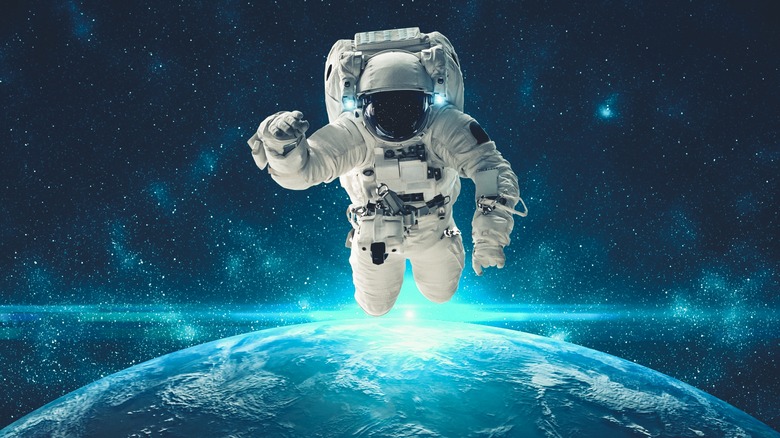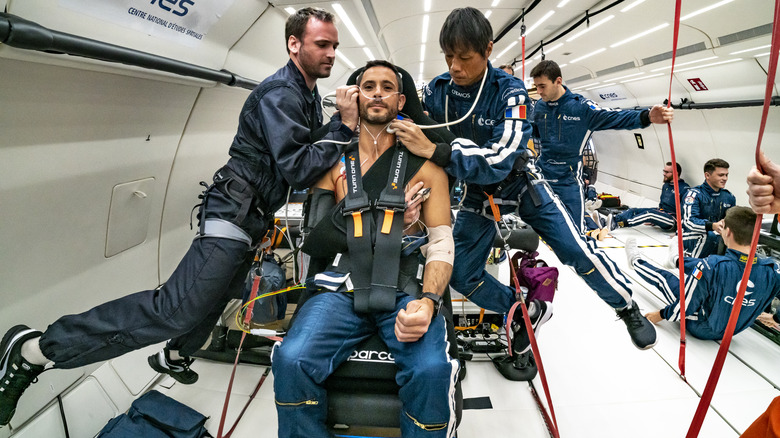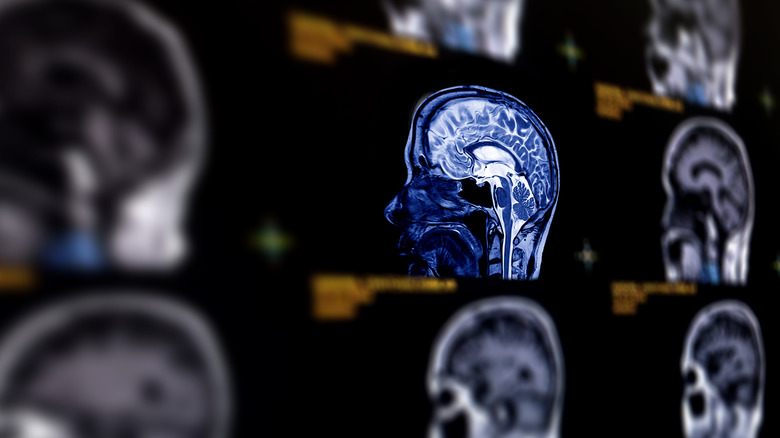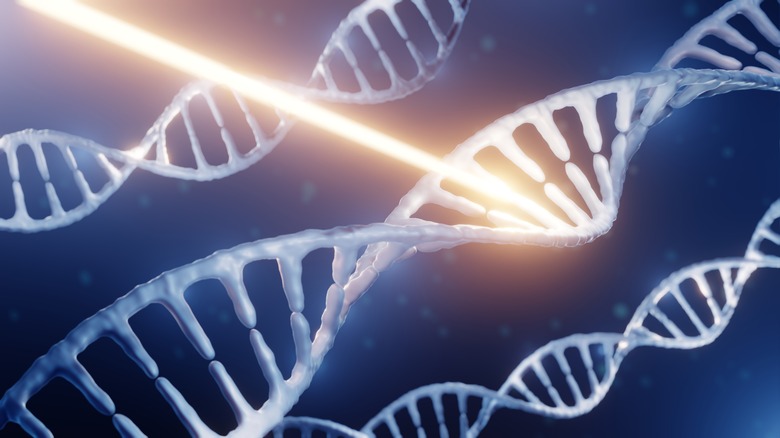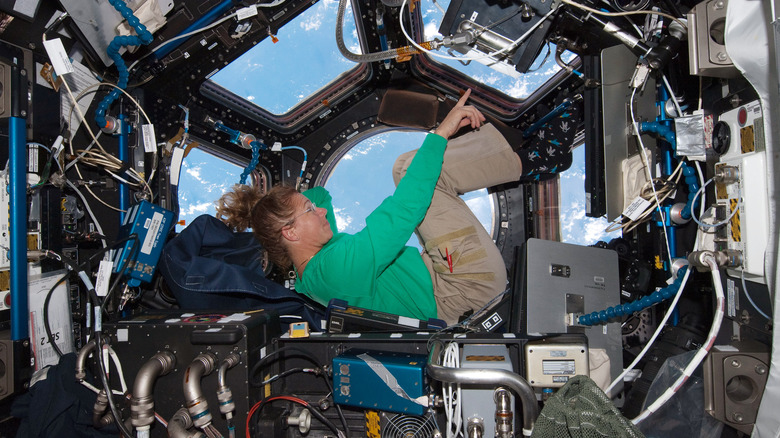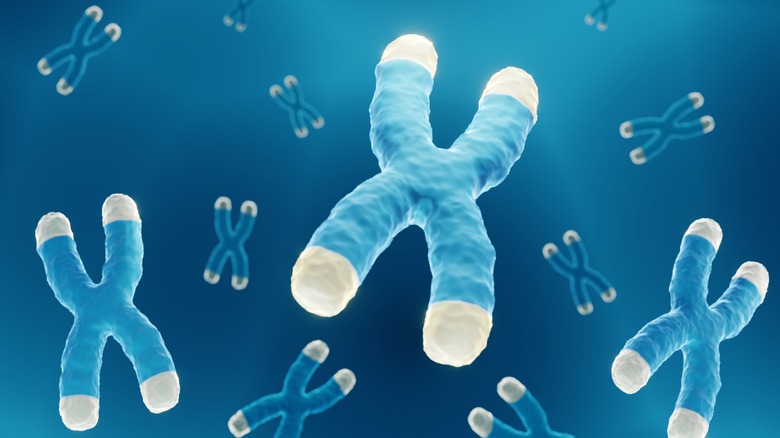5 Effects Space Has On The Human Body
This may not come as a surprise — if it does, apologies for blowing your mind — but humans evolved on planet Earth. As such, the human body is best adapted to the conditions on Earth's surface. This includes some attributes taken for granted most of the time: an atmosphere of 78% nitrogen and 21% oxygen, a magnetic field doubling as a space shield, and a clear sense of "up."
Now, brace yourself again, but space doesn't have these same features. Thus, it shouldn't come as any great surprise that when humans leave the Earth's grasp for the boundless space beyond, there are going to be some consequences.
Some of these consequences are specific to the current limits of technology, such as those related to living in a closed environment. Others are emotional, like the overview effect, or psychological, like the challenges associated with confinement, isolation, and communication delays as the distance from Earth increases. Some don't fit neatly into any category but are just plain awesome (astronauts technically time travel ever-so-slightly into the future). But for now, let's get physical. What happens to a person's body when they travel into space?
Space adaptation syndrome
If you were to blast off for space, one of the first things that might happen to your body is space adaptation syndrome, also known as space sickness. A constellation of symptoms, including nausea, vomiting, and headaches, are all common reactions to space travel, with Smithsonian Magazine reporting 70–90% of space shuttle passengers experiencing at least some level of space sickness.
Space sickness is not infectious but instead might be thought of as similar to car sickness. The sensation of weightlessness can cause misalignment between what the eyes observe and what the inner ears feel, leading to dizziness and retching. The parabolic flights used to simulate zero gravity for astronauts and civilians alike are nicknamed "vomit comets" for just this reason.
Some medications can help, but they may also come with their own symptoms, like drowsiness, which might be something a spacecraft pilot would be keen to avoid. There are also some behaviors the crew can adopt to prevent triggering space sickness, such as agreeing to remain right-side-up with respect to the spacecraft and each other.
The good news is that the human body is incredibly adaptable and usually learns to compensate for the lack of gravity within a day or two. The bad news? Returning to Earth can trigger the whole thing all over again in the form of "gravity sickness."
Spaceflight associated neuro-ocular syndrome (SANS)
Congratulations, you've made it to space; and you've recovered from your short bout of space sickness. What's next? There's a good chance you'll experience spaceflight-associated neuro-ocular syndrome or SANS. Most of the time, during a typical space mission — whether orbiting the Earth or traveling to the Moon — passengers experience weightlessness. Technically, gravity never stops acting on space travelers, but the spacecraft's motion cancels out this force, giving the impression of freefall. Much like in the case of space sickness, SANS is caused by prolonged weightlessness.
The human body contains a lot of fluid — the average adult is 55–60% water. On Earth, fluids are constantly pulled downward, and the body has evolved to compensate for this pull using complex networks to circulate and balance fluids from blood and lymph to bile and cerebrospinal fluid. In the presence of weightlessness, these systems have to compensate in ways not experienced during their development which can lead to health problems.
The lack of a downward pull allows more fluid to move up into the head. This increases pressure on the eyes and changes the shape and alignment of the optic nerves, retina, and the eyeball itself. As expected, this can negatively affect vision. There is also increased pressure on the brain, leading to structural changes. NASA is still studying how to combat this condition while investigating the short and long-term consequences of SANS, which occurs in about 70% of space station astronauts.
DNA damage
For all its apparent emptiness, there's one thing space has a heck of a lot of — radiation. Earth, itself being situated in space, is bombarded by radiation constantly both from the Sun and sources beyond. Some of it makes its way to the surface, such as ultraviolet rays, which cause sunburn. Other, generally harsher radiation is absorbed or otherwise deflected by the magnetic field generated by Earth's rotating iron core. Radiation can be observed following Earth's magnetic field lines in the far northern and southern latitudes in the form of auroras.
Orbital space stations like the ISS are relatively close to the Earth and are at least partially protected from cosmic radiation. But the Earth's protective magnetosphere won't be able to protect astronauts heading to the Moon or Mars. In space, radiation is constant, and it can sail right through the walls of a spacecraft and the bodies of any travelers inside. When high-energy particles collide with human cells, they can cause physical damage to molecules as important as DNA itself.
While the body can sometimes repair DNA damage, at times, it leads to cell death. In more extreme cases, it causes lasting mutations that the cells pass on when they divide. This increases the long-term risk of cancer the longer someone stays in space. NASA is working on methods to protect astronauts from radiation on future deep space missions, but for now, the risk remains present and serious.
Bone and muscle weakening
Should someone find themselves in space for more than just a quick jaunt, the continued weightlessness has more in store for the human body, and — shocker — it's not good. Floating around aboard a spaceship takes a lot of pressure off the lower body as there's no longer a way to stand or sit, and therefore no need to support the weight of the upper body.
On its surface, this might seem like a benefit. Weightlessness brings relief to stressed joints like knees and hips and tired muscles in the legs and abdomen. At the end of the day, it's always nice to kick your feet up, right? But under normal conditions, the stress on bones and muscles is part of a feedback loop that tells the body to continually repair and reinforce these tissues. Without use, the bones lose density, and the muscles lose mass.
Because there are no permanent space settlements (yet), the presumption is that any space traveler is going to return to Earth at some point. Bone and muscle loss can be a serious obstacle to reacclimating normal activities on this pale blue dot. To counteract this, astronauts exercise extensively while on longer missions. But this requires special equipment that takes up room that could be used for other scientific equipment, and it also takes time, of which astronauts have only a limited amount. For now, at least, it's the best solution we have.
Telomere lengthening
Space sickness. SANS. Radiation. Bone and muscle loss. Let's say we end on a more positive note. To do that, we need to talk about the twin study. Back in 2015, NASA sent astronaut Scott Kelly to space for one year. At the same time, Scott's identical twin brother Mark, an astronaut himself, remained on Earth. NASA took numerous biological samples from the brothers before, during, and after the mission to measure the effects of space on the human body. And one effect was completely unexpected: telomere lengthening.
If your DNA were a shoelace, the telomeres would be the plastic bits at the end that keep them from unraveling. Every time your cells divide, the telomeres get a little shorter. After enough divisions, the telomeres become so short that the cell cannot divide anymore and dies. Scientists are studying telomeres to find out what role they might play in the aging process. But imagine their surprise when a year in space caused telomeres to get longer.
But before you buy a Virgin Galactic ticket, know that space is no fountain of youth. Besides the other damaging effects of space already covered here, the samples from months after the twin study showed that after returning to Earth, Scott Kelly's telomeres returned to their original length. The reason for this is still an active area of research, but it's certainly an interesting finding, proving there are still plenty of things about space we still don't understand.
